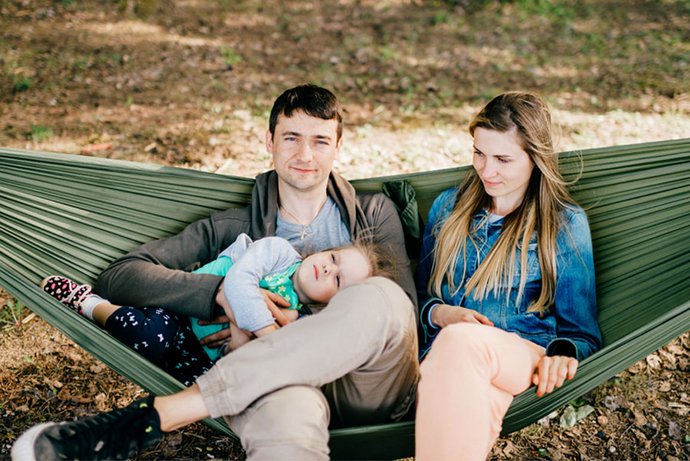In Germany, around three million children live with a mentally ill parent and 2.6 million children live with a parent suffering from addiction. When a parent suffers from a mental illness or addiction, the entire family is often affected. The situation is often stressful for children and can have a major impact on their future lives.
Improved care
The initiative “Stark im Sturm – Unterstützung für Kinder psychisch und suchterkrankter Eltern” (Strong in the Storm – Support for Children of Mentally Ill and Addicted Parents), developed at the Central Institute of Mental Health (CIMH) in Mannheim, aims to find the right support for affected parents and their children at an early stage. In the first phase of the project, the foundation was laid for improved care for affected parents and their children in hospitals. In all wards and outpatient clinics of the CIMH as well as the wards of the Clinic for General Psychiatry and Child and Adolescent Psychiatry at Heidelberg University Hospital and the Clinic for Addiction Therapy and Withdrawal at the Psychiatric Center Nordbaden (PZN), employees were trained as child representatives to support families. Their aim is to bring parents suffering from mental illness and addiction into contact with the appropriate counseling centers and support facilities while they are still in hospital, thus ensuring long-term help. In addition, extensive cooperation has been established between hospitals, youth welfare facilities and counseling centers in the region.
Reaching more families
The Dietmar Hopp Foundation has supported Stark im Sturm from the very beginning and will now fund the initiative for a further three years with around 1.5 million euros. As part of the master plan for child protection, the Baden-Württemberg Ministry of Social Affairs, Health and Integration is also supporting the initiative over two years with around 200,000 euros from state funds approved by the Baden-Württemberg state parliament.
“We would like to thank the Dietmar Hopp Foundation and the Ministry for their generous support. With their help, we can introduce Stark im Sturm at even more locations in Baden-Württemberg and expand our services. This will enable us to reach even more families,” says Dr. Yvonne Grimmer, Senior Physician at the Clinic for Child and Adolescent Psychiatry and Psychotherapy at the CIMH. She set up the initiative together with PD Dr. Anne Koopmann, Senior Physician at the Clinic for Addictive Behavior and Addiction Medicine at the CIMH. “This funding period is an important step on the way to our overarching goal: Stark im Sturm's support services should be available nationwide in the future,” says Koopmann.
Further clinics join in
The Dietmar Hopp Foundation is providing financial support for Stark im Sturm to establish child representatives in other clinics in Baden-Württemberg, expand the range of support services and conduct an accompanying scientific study. In addition to the clinics involved from the outset at the CIMH, the Clinic for General Psychiatry and Child and Adolescent Psychiatry at Heidelberg University Hospital and the Clinic for Addiction Therapy and Withdrawal at the PZN, the Center for Psychiatry (ZfP) Weinsberg, the ZfP Südwürttemberg, the entire PZN and Ulm University Hospital are now also joining in. In order to help parents who are less severely affected by their illness, special attention will be paid to outpatient clinics in future.
Collecting reliable data
In order to introduce Stark im Sturm into psychiatric care throughout Germany, it is important to find out more about the positive effects on affected parents and their children. How does their family life improve? Does their quality of life improve? These questions are to be answered in the second phase of the project and the data basis improved through scientific monitoring as part of a study.
Child protection master plan
In psychiatric and addiction clinics, it can be difficult to recognize child welfare risks if there is no direct contact with the child. Often there are only indirect indications and knowledge about different types of child endangerment can be expanded. With the Master Plan for Child Protection, the state of Baden-Württemberg is supporting the initiative to identify child welfare risks more quickly and react to potential dangers to children. To this end, standardized child protection measures are being developed and introduced at all participating clinics.
These include, for example, the standardized recording of parenthood: all patients are specifically asked whether they have children. Child protection screening supported by artificial intelligence is intended to help practitioners in difficult situations. The program provides information about the potential risk to children and gives recommendations for action. In addition, child protection specialists and child protection officers will receive more training. An e-learning course on child protection is being developed together with Ulm University Hospital. The course provides information on indications that a child's welfare is at risk and what measures should be taken in a suspected case.
Further information
More about the Stark im Sturm initiative at www.starkimsturm.de


